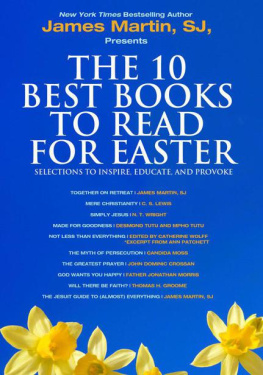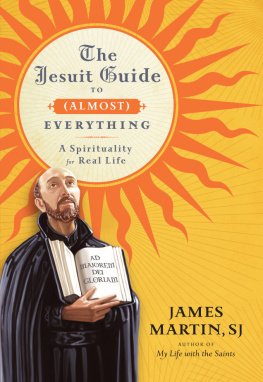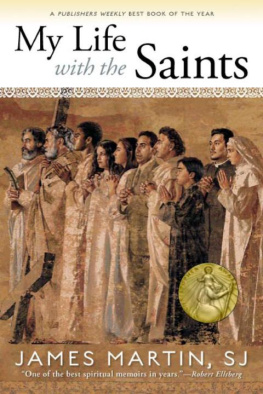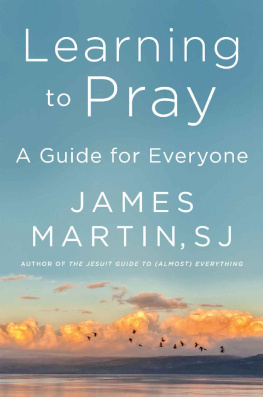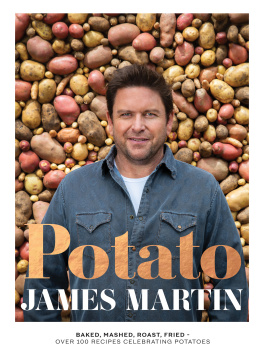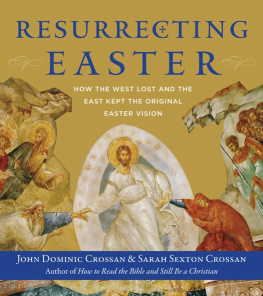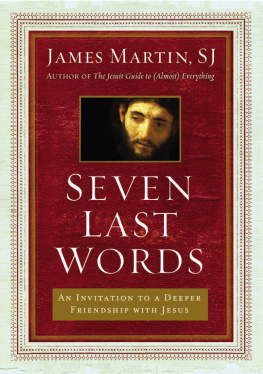The 10 Best Books to Read for Easter: Selections to Inspire, Educate, and Provoke
Excerpts from new and classic titles by bestselling authors in the field, presented by James Martin, SJ.

Contents
Cheap is good, a Jesuit friend of mine likes to say, but free is better.
I agree. But free doesnt have to mean worthless. This new (free) sampler of some of HarperOnes most popular new and classic books will invite you into an entirely worthwhile variety of perspectives on the Christian message.
Its the same message, of coursethe message that was first proclaimed by the astonished disciples on Easter morning: Christ is risen! But Christianity has always been presented in slightly different ways, depending on the writer, the medium, and the audience.
If that sounds a bit heretical, consider the Gospels. Matthew, Mark, Luke, and John were all writing in different times, from different places, and, most important, for different audiences. Thats one reason why some of the Gospel stories dont always match. To take the most obvious example, sometimes the Gospels dont even agree on the names of the Twelve Apostles, which one would think a rather important piece of data.
The Gospel writers understood what their audiences needed to hear (and later read) and what parts of Jesuss life, death, and resurrection were most meaningful to them. So they each stressed certain stories, people, and themes more than the other three evangelists. Matthews audience, for example, was largely a Jewish audience, so he takes pains to draw out some of the Old Testament connections to Jesuss ministry. Mark, on the other hand, was writing (most scholars say) in or around Rome, and so his Gospel seeks to encourage his audience to stand firm in their faith, and his narrative also highlights Jesuss patient suffering. The variations in the Gospels arent proof that theyre inaccurate, just that theyre written by four different people at four different times for four different audiences.
The chapters youre about to read in this worthy new collection hope to do something similar. No, Im not comparing them to the Gospels. But they are written by talented writers and scholars who seek to present the person of Jesus, and the enduring impact of the church, to new audiences. The writers approach Jesus from a variety of viewpoints: carpenter from Nazareth, the Risen One, the Suffering Servant, the Man of Sorrows, and even the Man of Joys. They offer their insights on how his life, death, and resurrection influenced the early church, the contemporary world, and todays believer. But they do so in different ways, to inspire, educate, and sometimes provoke.
Not all of these authors will agree with one another ( just like the Gospel writers dont always agree). Nor do I agree with everything in this collection. But each of these writers displays their passion about the same person: the man who first called the fisherman by the Sea of Galilee to leave everything and follow him; who made the lame walk, caused the deaf to hear, and raised the dead; who defeated death on Easter Sunday; and who later inspired Matthew, Mark, Luke, and John to write their timeless works of faith.
So heres an invitation: Why not try out these free chapters and see if you might want to read the authors entire work? Let it be a kind of invitation. What do these noted authors have to say about Jesus and the mission of the church?
As the man himself said, Come and see.
--James Martin, SJ



Traditional site of the Breakfast by the Sea
The Breakfast by the Sea
N OW FOR OUR FINAL encounter with Jesus by the Sea of Galilee. But first a question. What is the worst thing youve ever done? Your greatest sin? What do you most bitterly regret? To whom were you the most insensitive or cruel? In short, what are you most ashamed of ?
Second, and more important, do you believe that God can forgive you for that sin? And do you believe that God forgives others for their sins? Finally, do you forgive others for their sins against you, no matter how great?
I know thats a lot to think about. But those questions are at the heart of the Christian message. They are also at the heart of the Gospel reading often called the Breakfast by the Sea. Although this episode near the Sea of Galilee is often seen as the one in which Jesus bestows on Peter the title of pastor or shepherd, it is also a vivid story about the power of forgiveness.
Here is the final passage Id like to invite you into, from the Gospel of John (21:119):
After these things Jesus showed himself again to the disciples by the Sea of Tiberias; and he showed himself in this way. Gathered there together were Simon Peter, Thomas called the Twin, Nathanael of Cana in Galilee, the sons of Zebedee, and two others of his disciples. Simon Peter said to them, I am going fishing. They said to him, We will go with you. They went out and got into the boat, but that night they caught nothing.Just after daybreak, Jesus stood on the beach; but the disciples did not know that it was Jesus. Jesus said to them, Children, you have no fish, have you? They answered him, No. He said to them, Cast the net to the right side of the boat, and you will find some. So they cast it, and now they were not able to haul it in because there were so many fish. That disciple whom Jesus loved said to Peter, It is the Lord! When Simon Peter heard that it was the Lord, he put on some clothes, for he was naked, and jumped into the sea. But the other disciples came in the boat, dragging the net full of fish, for they were not far from the land, only about a hundred yards off.When they had gone ashore, they saw a charcoal fire there, with fish on it, and bread. Jesus said to them, Bring some of the fish that you have just caught. So Simon Peter went aboard and hauled the net ashore, full of large fish, a hundred fifty-three of them; and though there were so many, the net was not torn. Jesus said to them, Come and have breakfast. Now none of the disciples dared to ask him, Who are you? because they knew it was the Lord. Jesus came and took the bread and gave it to them, and did the same with the fish. This was now the third time that Jesus appeared to the disciples after he was raised from the dead.When they had finished breakfast, Jesus said to Simon Peter, Simon son of John, do you love me more than these? He said to him, Yes, Lord; you know that I love you. Jesus said to him, Feed my lambs. A second time he said to him, Simon son of John, do you love me? He said to him, Yes, Lord; you know that I love you. Jesus said to him, Tend my sheep. He said to him the third time, Simon son of John, do you love me? Peter felt hurt because he said to him the third time, Do you love me? And he said to him, Lord, you know everything; you know that I love you. Jesus said to him, Feed my sheep. Very truly, I tell you, when you were younger, you used to fasten your own belt and to go wherever you wished. But when you grow old, you will stretch out your hands, and someone else will fasten a belt around you and take you where you do not wish to go. (He said this to indicate the kind of death by which he would glorify God.) After this he said to him, Follow me.
Next page
